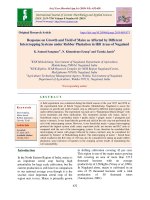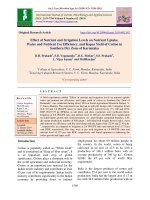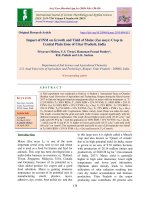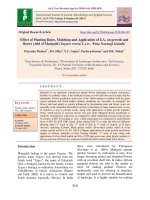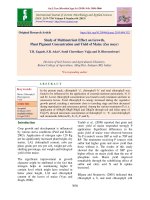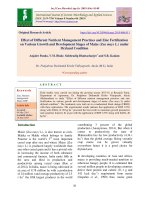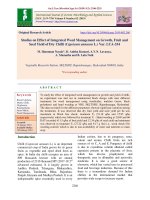Biomass and seed yield of maize with effective tillering trait: CRTM-2
Bạn đang xem bản rút gọn của tài liệu. Xem và tải ngay bản đầy đủ của tài liệu tại đây (280.77 KB, 6 trang )
Int.J.Curr.Microbiol.App.Sci (2019) 8(6): 3355-3360
International Journal of Current Microbiology and Applied Sciences
ISSN: 2319-7706 Volume 8 Number 06 (2019)
Journal homepage:
Original Research Article
/>
Biomass and Seed Yield of Maize with Effective Tillering Trait: CRTM-2
N. Jyothi Lakshmi*, P. Raghuram Reddy, Amol Patil, M. Vanaja,
K. Salini, B. Sarkar, S. S. Shishodia, S.K. Yadav, V. Maruthi, M. Maheswari,
K. Sammi Reddy and G. Ravindra Chary
Central Research Institute for Dryland Agriculture, Santhoshnagar, Hyderabad, India
*Corresponding author
ABSTRACT
Keywords
Tillering maize, Zea
luxuriance,
Effective tillers,
Effective cobs,
Biomass and seed
yield
Article Info
Accepted:
18 May 2019
Available Online:
10 June 2019
Maize genotype with effective tillers was developed from a natural mutant with ineffective
tillers at Central Research Institute for Dryland Agriculture, Hyderabad, India. Teosinte
(Zea mays ssp. luxurians), African tall (fodder maize) and Harsha (composite) were
included for development of CRIDA tillering maize viz., CRTM-2. Single plant of CRTM2 had five effective tillers similar to Teosinte, with a total height of 1223.5 cm, 62.0 leaves
and 25.8 filled cobs. CRTM-2 showed an increase of 530.3, 423.7 and 2086.0% over
Harsha, 388.0, 315.8 and 2350 % over African tall and 15.5, 34.1 and -53.0 % over
teosinte, for plant height, number of leaves and number of filled cobs respectively
averaged over four seasons viz., 2016 (kharif and rabi), 2017 kharif and 2018 kharif.
CRTM-2 had tillers like teosinte and the shape of cobs and seed type of maize. The
percentage of superiority of CRTM-2 for seed yield /plant was 227.8%, 27.4% and 22.5%
over Teosinte, African tall and Harsha respectively. It also showed superiority for total
biomass. It was 102.7%, 21.5% and 63.5% over Teosinte, African tall and Harsha
respectively. This tillering maize can be source material for innovative concept of
developing new tillering maize varieties with effective cobs and significantly higher
productivity and production of feed, fodder and food for animals, poultry and humans
apart from industrial uses.
Introduction
Maize (Zea mays L.) is one of the most
important crops in the world, being among the
primary sources of human food, animal feed,
and raw material for some industrial
processes. Maize has wider adaptability under
varied agro-climatic conditions. Wild species
are important sources of genetic variability
and may be exploited by breeding programs to
introgress desirable traits. The potential use of
Teosinte in maize breeding has been evaluated
since 1950s. Researchers concluded that
Teosinte is a valuable germplasm for maize
improvement, providing resistance to diseases
and other abiotic stresses (Reeves, 1950), as
well as quantitative traits (Cohen and Galinat,
1984; Casas et al., 2001). Some of the
ancestral maize species have the prolificacy
characteristics. Recently their architecture
related to particular traits has been elucidated
(Weber et al., 2008). Such studies suggested
the relationship between specific gene and
3355
Int.J.Curr.Microbiol.App.Sci (2019) 8(6): 3355-3360
trait variation in Teosinte.
The annual teosinte, Zea mays ssp. luxurians,
has tillering ability, having 6-7 tillers with
tender stem, many small leaves and many very
small cobs. It is highly palatable to the
animals with high nutritive value. However
the seeds are very hard, small sized and bitter
in taste and low yielding. African tall is a tall,
single stemmed, many leafed with white
seeded cob and matures in 130-135 days. It
produces higher green fodder yield and good
silage can also be prepared from it. Maize
composite variety Harsha is yellow-orange
seeded, drought tolerant, high yielding and
matures in 100-110 days.
Present study was aimed to develop tillering
maize having more no. of tillers with effective
cobs, more no. of leaves/plant and cobs with
effective seeds from a natural mutant with
ineffective tillers using Teosinte, African tall
and Harsha.
Materials and Methods
A natural mutant with tillers was first
identified in Hayathnagar Research Farm of
CRIDA, Hyderabad during 1990. It had
ineffective tillers (tillers with low height and
ineffective cobs). To improve the number of
effective tillers along with height it was
crossed with teosinte. The progeny of natural
mutant and teosinte was crossed with African
tall to improve tiller height. The above
progeny was crossed with Teosinte and
African tall, using them as male parent was
done in alternate seasons. After 4 years of
above crossing, the progeny were crossed with
normal maize (composite-harsha) and
recurrent selection was followed and single
plants were selected with desirable
characteristics of higher number of tillers,
tillers with effective cobs and normal maize
type seed.
The crop was sown in kharif season during
June month in 2016, 2017 and 2018 and rabi
season during November 2016. Teosinte,
African tall and Harsha were sown along with
CRTM-2 in all the seasons. The spacing was
75x30 cm between rows and within a row
respectively. Recommended dose of fertilizer
for maize at the rate of 120:60:60 kg/ha of N,
P2O5 and K2O was applied to the crop. Crop
was maintained free from moisture stress,
pests and diseases. Crop was grown in 3
replications. Each replication had 2 rows of 5
meter length. Crop duration of CRTM-2 was
about 105-110 days. The checks Harsha and
African tall matured in 110 and 135 days
respectively.
At maturity, three plants of each genotype
were used to determine above ground dry
matter accumulation and seed yield. Plant
height, number of leaves and no. of cobs were
recorded. Dry weights were recorded after
keeping the leaf, stem and tassel at 80o C for
48 hours in hot air oven. Cobs were sun dried.
Total biomass and seed yield per plant was
recorded.
Results and Discussion
The unique characters of CRTM-2, tillering
maize developed at CRIDA is presented in
figure 1. The tillering maize showed five
effective tall tillers apart from main stem and
high number of leaves and filled cobs.
Anova for number of tillers, total plant height,
number of leaves, number of cobs, total
biomass and seed yield per plant in CRTM-2
and checks/parents, Teosinte, Harsha and
African tall over mean data of four seasons
viz; 2016k,2016R, 2017k and 2018k are
presented in table 1. The results revealed that
CRTM-2 was significantly different from
Teosinte, African tall and Harsha for all the
characters studied. CRTM-2 had 5 tillers per
plant as that of Teosinte.
3356
Int.J.Curr.Microbiol.App.Sci (2019) 8(6): 3355-3360
Fig.1 The tillers, leaves, cobs and seed of tillering maize CRTM-2
Table.1 Anova for No. of tillers, total plant height, No. of leaves, No. of cobs, total biomass and
seed yield per plant in CRTM-2 and checks/parents, teosinte, harsha and African tall over mean
data of four seasons viz; 2016k, 2016R, 2017k and 2018k.
Parameters
CRTM-2
Genotypes
Teosinte
African tall
Harsha
No. of tillers
5
5
-
-
Plant Height (cm)
No. of leaves
1223.5 a
62.0 a
1057.3 b
47.3 b
250.3 c
15.0 c
194.8 c
11.9 d
No. of filled cobs
25.8 a
55.0 b
1.1 c
1.2 c
Total biomass(g/pl)
411.0 a
202.8 d
338.4 b
251.2 c
Seed Yield(g/pl)
132.1 a
40.3 c
103.7 b
107.8 b
Note: values followed by the same letter in a row are not significantly different at P=0.01.
3357
Int.J.Curr.Microbiol.App.Sci (2019) 8(6): 3355-3360
Table.2 Number of tillers, height, number of leaves and number of filled cobs on main stem and tillers in CRTM-2 and its superiority
over Teosinte, African tall and Harsha for four seasons viz., 2016k 2016R, 2017k and 2018k
CRTM-2
Main stem /Tiller
Height (cm)
2017
2018
K
K
257
262
241
248
225
223
210
215
200
198
192
190
1325
1336
2016
K
247
217
187
180
125
109
1065
2016
R
233
231
206
175
168
155
1168
185
180
175
169
152
143
1004
233
175
192
187
189
181
159
146
1054
243
176.5
195
190
190
180
165
142
1062
255
197.8
% inc. or dec. of CRTM-2 over
Teosinte
6.1
10.8
Main stem
Tiller 1
Tiller 2
Tiller 3
Tiller 4
Tiller 5
Total
Checks/parents
Teosinte
Main stem
Tiller 1
Tiller 2
Tiller 3
Tiller 4
Tiller 5
Total
African tall
Harsha
No. of leaves
2017
2018
K
K
12
11
11
11
11
10
11
10
10
10
9
10
64
62
249.8
234.3
208.5
196.8
172.8
161.5
1223.5
2016
K
10
10
10
10
10
10
60
2016
R
12
10
10
10
10
10
62
202
197
192
186
175
157
1109
270
230
193.5
188.5
186.5
179.0
162.8
147.0
1057.3
250.3
194.8
8
8
8
8
7
7
46
15.5
11
8
8
8
7
7
7
45
15.5
11
8
8
8
8
7
7
46
14
13.3
24.8
20.5
15.5
30.4
37.8
Mean
No. of filled cobs
2016
201 201
R
7K
8K
5
5
7
3
8
5
3
7
7
5
3
3
3
5
4
2
4
4
21
32
30
11.3
10.5
10.3
10.3
10.0
9.8
62.0
2016
K
6
4
3
3
3
1
20
8
8
8
8
8
8
48
14.8
12.2
8.0
8.0
8.0
7.8
7.3
7.3
46.3
15.0
11.9
22
7
7
7
6
6
55
1
1.2
20
7
7
7
6
6
53
1
1.3
21
7
7
7
6
6
54
1
1.3
24
7
7
7
6
6
57
1.2
1
21.8
7.0
7.0
7.0
6.0
6.0
54.8
1.1
1.2
39.1
29.2
34.1
-63.6
-60.4
40.7
310
0
236
2
47.4
240
0
290
0
53.0
235
0
208
6
Mean
African tall
357.1
380.7
419.6
394.8
388.0
287.1
300.0
357.1
318.9
315.8
1900
2000
Harsha
508.6
561.8
569.9
480.9
530.3
445.5
416.7
424.6
408.2
423.7
1567
1515
3358
Mea
n
5.8
5.0
5.0
3.5
3.8
2.8
25.8
Int.J.Curr.Microbiol.App.Sci (2019) 8(6): 3355-3360
Table.3 Total biomass and seed yield per plant of CRTM-2 and its superiority over
checks/parents viz., Teosinte, African tall and Harsha for four seasons viz 2016k 2016R, 2017k
and 2018k
CRTM-2
Biomass (g/pl)
2016
2016
2017
2018
Main stem
K
R
K
K
/Tiller
112.5
100.5
100.7
100.5
Main stem
68.3
67.3
86.7
78.1
Tiller 1
55
65.4
78
86.5
Tiller 2
51.6
72.8
50.9
51.4
Tiller 3
57.7
51
60.2
61.3
Tiller 4
38.9
41.5
46.4
60.9
Tiller 5
Total
384.0
398.5
422.9
438.7
Checks/parents
186.1
199.2
217.4
208.6
Teosinte*
321.0
323.8
357.4
351.4
African tall
225.5
246
274.3
259.2
Harsha
% inc. or dec. of CRTM-2 over
106.3
100.1
94.5
110.3
Teosinte
19.6
23.1
18.3
24.8
African tall
70.3
62.0
54.2
69.3
Harsha
Seed Yield (g/pl)
2016
2017
2018
R
K
K
26.9
24.9
34
19.1
34.7
30.1
17.9
33.9
31.7
28
13.7
16.4
15.8
22
21
9.7
15.4
19.6
117.4
144.6
152.8
Mean
2016K
103.6
75.1
71.2
56.7
57.6
46.9
411.0
35.12
23.8
17.8
16.046
15.708
5.112
113.6
202.8
338.4
251.3
38.5
91
91
40
95
101
102.7
21.5
63.5
195.6
25.1
25.1
193.5
23.6
16.2
43.8
116.9
121
230.1
23.7
19.5
Mean
30.2
26.9
25.3
18.5
18.6
12.5
132.1
38.9
112
118
40.3
103.7
107.8
292.8
36.4
29.5
227.8
27.4
22.5
CRTM-2 recorded 1223.5cm, 62.0, 25.8,
411.0g/pl, 132.1g/pl for plant height, number
of leaves, number of cobs, total biomass and
seed yield respectively. The values of CRTM2 are significantly higher than Teosinte,
African tall and Harsha for above characters
mentioned except for no. of filled cobs over
Teosinte.
and 11.9 for Teosinte, African tall and Harsha
respectively. The average no. of filled cobs on
the main plant was 5.8 in CRTM-2, while for
the five tillers it ranged from 2.8-5.0 numbers
with total no. of filled cobs for single plant
being 25.8 while the checks Teosinte, African
tall and Harsha recorded 55.0, 1.1 and 1.2
respectively.
Number of tillers, height, number of leaves
and number of filled cobs on main stem and
tillers in CRTM-2 and its superiority over
Teosinte, African tall and Harsha for four
seasons viz., 2016k, 2016R, 2017k and 2018k
are presented in table 2. CRTM-2 showed an
average height of 249.8 cm for main stem
with a range of 161.5 cm to 234.3 cm in the
height of five tillers. The total height of main
stem and 5 tillers put together was 1223.5 cm
while the checks Teosinte, African tall and
Harsha recorded 1057.0, 250.3 and 194.8 cm
respectively. The average no. of leaves was
11.3 on main plant with a range of 9.8 to 10.5
in five tillers. The total no. of leaves per plant
was 62.0 while for checks it was 46.3, 15.0
The mean data for total biomass and seed
yield over four seasons are given in table 3.
CRTM-2 recorded an average biomass of
103.6 g for main stem with a range of 46.9g
to 75.1g biomass for five tillers. The total
biomass of main stem and 5 tillers put
together was 411.0g/plant in CRTM-2 while
the checks Teosinte, African tall and Harsha
recorded 202.8, 338.4 and 251.3 g/plant
respectively. The average seed yield was
30.2g on main stem with a range of 12.5 to
26.9g in five tillers. The total seed yield per
plant was 132.1 for CRTM-2, while for
checks it was 40.3, 103.7 and 107.8 for
Teosinte,
African
tall
and
Harsha
respectively. It is interesting to note at this
3359
Int.J.Curr.Microbiol.App.Sci (2019) 8(6): 3355-3360
stage that the cobs of Teosinte are too small in
size while CRTM-2 had bigger size of cobs as
evident from number of cobs and seed yield
in teosinte (54.8 cobs and 40.3g/pl) and
CRTM-2 (25.8 cobs and 132.1 g/pl). CRTM-2
had seeds similar to maize.
The percentage of superiority of CRTM-2
over Teosinte, African tall and Harsha for
plant height was 15.5%, 388.0% and 530.3 %
averaged over 4 seasons (Table 2). For
number of leaves, the superiority of tillering
maize was 34.1%, 315.8%, and 423.7% over
Teosinte,
African
tall
and
Harsha
respectively. Similarly for no. of cobs the
superiority of CRTM-2 over African tall and
Harsha was 2350.0% and 2086.0 %
respectively. However there was decrease in
number of cobs in CRTM-2 (-53.0%)
compared to Teosinte.
The percentage of superiority of CRTM-2
over Teosinte, African tall and Harsha for
total biomass was 102.7, 21.5% and 63.5%
while for seed yield/plant it was 227.8, 27.4%
and 22.5% respectively averaged over 4
seasons (Table 3).
The superiority of tillering maize, CRTM-2
for tillering trait, biomass and seed yield over
the checks African tall and Harsha and with
maize type cobs and seed reveals it to be very
potential innovative genotype.
CRTM-2 can be source material for
innovative concept of developing new
tillering maize varieties with effective cobs
for higher productivity of fodder, poultry feed
and human food apart from industrial uses.
How to cite this article:
References
Casas SJF, Sánchez GJJ, Ramírez DJL, Ron
PyS, Montes HJ. 2001. Rendimiento y
sus componentes en retrocruzas maízteocintle. Revista Fitotecnia Mexicana
24, 17 –26.
Cohen JI, Galinat WC. 1984. Potential use of
alien
germplasm
for
maize
improvement.
Crop Science 24, 1011–1015.
Doyle, J.J and Doyle J.L. Isolation of plant
DNA from fresh tissue. Focus, v.12,
p.13-15, 1990
Jaccard, P.1901 Etude comparative de la
distribution florale dans une portion
desalpes et des jura, Bull. Soc. Vaud.
Sci. Nat. 37: 547-579.
Murray, H.G and W.F. Thompson, 1980
Rapid isolation of high molecular
weight plant DNA, Nucleic. Acids. Res.
8: 4321-4325.
Perrier X., A. Flori and F. Bonnot, 2003 Data
analysis methods, in: P. Hamon, M.
Seguin, X. Perrier, J.C. Glaszmann
(Eds.), Genetic Diversity of Cultivated
Tropical Plants, Enfield, Science
Publishers, Montpellier, pp. 43-76.
Reeves RG. 1950. The use of teosinte in the
improvement of corn inbreds. Agronony
Journal 42, 248–251.
Weber, A. L., William H.B., Rucker J.,
Baltazar M.B., J. de Jesus sanchezgonzalez, Feng P., Buckler E.S. and
Doebley J., 2008 The Genetic
Architecture of Complex Traits in
Teosinte (Zea mays ssp. parviglumis):
New Evidence From Association
Mapping Genetics, 180: 1221-1232
Jyothi Lakshmi, N., P. Raghuram Reddy, Amol Patil, M. Vanaja, K. Salini, B. Sarkar, S.S.
Shishodia, S.K. Yadav, V. Maruthi, M. Maheswari, K. Sammi Reddy and Ravindra Chary, G.
2019. Biomass and Seed Yield of Maize with Effective Tillering Trait: CRTM-2.
Int.J.Curr.Microbiol.App.Sci. 8(06): 3355-3360. doi: />
3360
